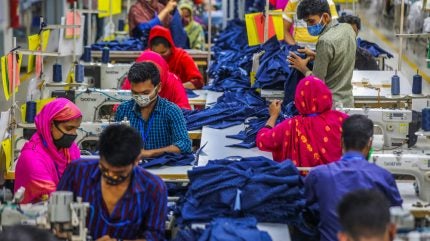
The Clean Clothes Campaign explained its decision to revise its participation was based on a “careful weighing” of the impact it can have by focusing its resources on “binding actions” that will have “structurally lasting impacts for workers”.
It said it carried out a thorough analysis of Fair Wear’s policies and its members’ achievements especially in the areas of supply chain transparency, the International Accord and living wages, and stated: “There is a gap between our network’s long term goals around binding enforceable agreements and legislation and the low level of enforceability inherent to voluntary MSIs [multi-stakeholder initiatives]”.
The Clean Clothes Campaign claimed voluntary MSIs lack the “legal enforceability” to bring about the level of structural, tangible progress that it wants to see and has advocated for through its participation in Fair Wear’s Board and CoE.
The organisation explained that its wider goal is to ensure “workers can leverage their power and not depend on voluntary standards for brands”.
However, it added that as a network it remains committed to engaging with Fair Wear, its member companies and other stakeholders to achieve specific as well as structural change for workers.
Clean Clothes Campaign said: “We will continue to be a stakeholder and we very much hope to have regular meetings with Fair Wear in order to continue sharing our views and positions. The departure of our network’s representatives from the board and CoE does not preclude any CCC members from being able to access the initiative’s complaint mechanism, participating in Fair Wear’s structures and content discussions or otherwise collaborating.”
It also expressed its openness to discussing new opportunities for involvement in Fair Wear’s governance structure if the organisation chooses to “adopt enforceable, binding commitments on deliverable outcomes by member brands in the future.”
Fair Wear Foundation pointed out in a statement the Clean Clothes Campaign, alongside trade unions and employers’ associations, was one of the co-founders of Fair Wear Foundation: “In these 25 years, a lot has been achieved and yet there is so much more to be done to realise the goal both organisations share: full realisation of workers’ rights in the garment supply chain.”
It noted that with the advent of due diligence legislation and binding agreements like the International Accord for Health and Safety, both organisations are committed to ensuring regulation delivers actual impact for workers, but added: “In view of their complementary roles, the Clean Clothes Campaign has decided to focus its resources on its campaign work and its work pushing for legally binding agreements that empower workers and hold companies to account.”
The Fair Wear Foundation explained its own focus is to push the bar on how due diligence can be implemented in practice to improve working conditions and realise workers’ rights.
It concluded: “In this context, the Clean Clothes Campaign will no longer contribute to Fair Wear’s work through its governance structure, but the two organisations will continue to work closely together; both at the central level and through the many linkages between Fair Wear teams and the Clean Clothes Campaign network in production countries. The Clean Clothes Campaign’s network of members and partners are not in any way precluded from continuing their engagement with Fair Wear.“
Earlier this month, the Clean Clothes Campaign called out global fashion brands for allegedly failing to protect Bangladesh garment workers who are said to be facing criminal charges for engaging in 2023’s higher minimum wage protests.



